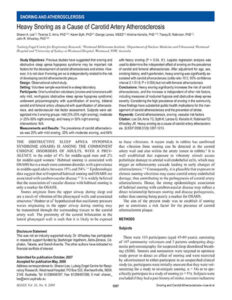
In the landscape of sleep medicine and vascular health, the association between heavy snoring and carotid artery atherosclerosis has garnered significant attention. Sharon et al.’s seminal study, published in SLEEP in 2008, serves as a beacon in unraveling this intriguing link, shedding light on the potential implications of snoring patterns for cardiovascular risk assessment and management.
Heavy snoring, a common manifestation of obstructive sleep apnea (OSA), has long been recognized as a hallmark symptom of upper airway obstruction during sleep. While the adverse cardiovascular effects of OSA are well-documented, Sharon and colleagues delve deeper into the specific relationship between heavy snoring and carotid artery atherosclerosis, a key precursor to stroke and cardiovascular events.
Through meticulous analysis and imaging techniques, the study elucidates a compelling association between heavy snoring and the presence of carotid artery atherosclerosis, independent of traditional cardiovascular risk factors. By assessing snoring intensity and frequency alongside objective measures of atherosclerotic burden, the researchers uncover a potential pathway whereby chronic vibration and turbulence within the upper airway during snoring may promote endothelial dysfunction and arterial plaque formation.
The implications of these findings extend beyond the realm of sleep medicine, offering valuable insights into novel avenues for cardiovascular risk stratification and preventive interventions. By identifying heavy snoring as a potential marker of underlying vascular pathology, clinicians may be better equipped to identify high-risk individuals for targeted screening and early intervention.
Furthermore, Sharon et al.’s study underscores the importance of interdisciplinary collaboration between sleep specialists, cardiologists, and vascular experts in elucidating the complex interplay between sleep-disordered breathing and cardiovascular disease. Through synergistic efforts and knowledge exchange, researchers can further unravel the mechanistic underpinnings of snoring-related atherosclerosis and develop tailored approaches to mitigate cardiovascular risk in affected individuals.
In summary, Sharon et al.’s investigation into heavy snoring as a cause of carotid artery atherosclerosis represents a seminal contribution to the field of sleep medicine and vascular health. By highlighting the potential cardiovascular implications of snoring patterns, the study underscores the importance of comprehensive sleep assessment and management in mitigating cardiovascular risk and improving patient outcomes.





